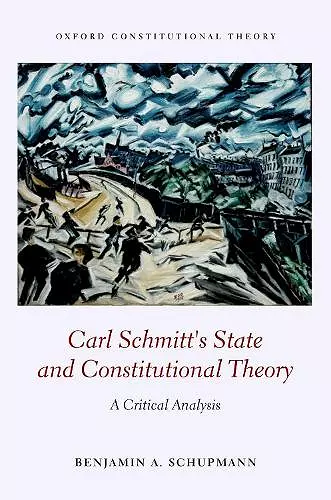Carl Schmitt's State and Constitutional Theory
A Critical Analysis
Format:Hardback
Publisher:Oxford University Press
Published:7th Dec '17
Currently unavailable, and unfortunately no date known when it will be back

Can a constitutional democracy commit suicide? Can an illiberal antidemocratic party legitimately obtain power through democratic elections and amend liberalism and democracy out of the constitution entirely? In Weimar Germany, these theoretical questions were both practically and existentially relevant. By 1932, the Nazi and Communist parties combined held a majority of seats in parliament. Neither accepted the legitimacy of liberal democracy. Their only reason for participating democratically was to amend the constitution out of existence. This book analyses Carl Schmitt's state and constitutional theory and shows how it was conceived in response to the Weimar crisis. Right-wing and left-wing political extremists recognized that a path to legal revolution lay in the Weimar constitution's combination of democratic procedures, total neutrality toward political goals, and positive law. Schmitt's writings sought to address the unique problems posed by mass democracy. Schmitt's thought anticipated 'constrained' or 'militant' democracy, a type of constitution that guards against subversive expressions of popular sovereignty and whose mechanisms include the entrenchment of basic constitutional commitments and party bans. Schmitt's state and constitutional theory remains important: the problems he identified continue to exist within liberal democratic states. Schmitt offers democrats today a novel way to understand the legitimacy of liberal democracy and the limits of constitutional change.
Benjamin Schupmann's Carl Schmitt's State and Constitutional Theory emphasizes the verb metaphor constrain ... Schupmann redefines Karl Loewenstein's 1938 concept of "militant democracy" as "constrained democracy." * Richard R. Weiner, Rhode Island College, The European Legacy *
Schupmann's detailed and compelling reconstruction of Carl Schmitt's state and constitutional theory ... [T]he complexity and systematicity of these debates about the relationship between law and politics under stress are often forgotten. Schupmann brings them back to life * Duncan Kelly, University of Cambridge, Perspectives on Politics *
... Schupmann works with a wide range of sources and, unlike much of the recent English language scholarship on Schmitt, he ought to be congratulated for his detailed engagement with German language primary sources and scholarship. Indeed, part of the merit of Schupmann's project is that he is able to evaluate Schmitt's shorter essays, unavailable in English translation at the time of publication, in order to offer a broader interpretation of Schmitt's thought. Thus, often-overlooked texts such as 'On TV Democracy', 'On Friedrich Meinecke's Idea of raison d'état' and 'Basic Rights and Basic Duties' all find their way into Schupmann's account of Schmitt's state and constitutional theory. * Joshua Smeltzer, University of Cambridge, LSE Review of Books *
Benjamin Schupmann's stimulating study ... provides a clear and accessible account of the disputes between statutory positivists and antipositivists, toggling between theoretical debates and political events to make Schmitt's methodological perspective intuitively plausible to readers. He provides an illuminating analysis of Schmitt's concept of representation, and makes a persuasive case that Schmitt based his concept of sovereign authority on Max Weber's ideal type of "office charisma". * Joshua Derman, Hong Kong University of Science and Technology, H-Diplo *
Schupmann's book is, consequently, most important because of its refreshing and innovative interpretation of Schmitts writings as a whole. By tracing and reconstructing arguments spanning his pre-war writings to later in his life, Schupmann shows that there is continuity and a coherent core to Schmitt's thought, thus convincingly challenging Schmitt's reputation of opportunism and illiberalism. This book is highly recommended for anyone interested in Schmitt, in particular, those willing to look beyond Schmitt the man and get to know Schmitt the theorist. * Laetitia Houben, European Constitutional Law Review *
Our understanding of Carl Schmitts work is bedevilled by two things: Schmitts genius for polemical, mystifying, and esoteric discourse, and the passionate polemical reactions that Schmitts incendiary theoretical propositions provoke. In this deeply learned, and insightful book, Schupmann elegantly and accessibly reconstructs Schmitts political and legal theory as a whole, in the context of early twentieth-century German politics and continental political and social theory. The result is illuminating and demystifying, allowing us to better grasp whether, in fact, Carl Schmitts oeuvre continues to hold lessons for us in this new epoch of populism, state collapse, and (multi-)polarization. * Nehal Bhuta, Professor of Public International Law, European University Institute, Florence *
This is an important scholarly work with clear political implications. Schupmann develops a crucial dimension of the work of Carl Schmitt, the theorist of militant democracy. In this analysis, the fundamental flaw of liberal democracy is its inability to guard itself against authoritarian projects relying on the legality of the inherited amendment rule. Schupmann argues that both Schmitt's theory of the limits of amendment, and his justification of emergency provisions of constitutions should be understood in terms of this dilemma. The book is a must for all those interested in Schmitt. * Andrew Arato, Dorothy Hirshon Professor, The New School for Social Research *
ISBN: 9780198791614
Dimensions: 240mm x 164mm x 20mm
Weight: 542g
256 pages